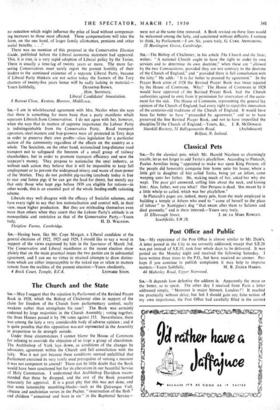The Church and the State
SIR.—May I suggest that the rejection by Parliament of the Revised Prayer Book in 1928, which the Bishop of Chichester cites in support of the claim for freedom of the Church from parliamentary control, really weakens rather than strengthens his case? The Book was certainly endorsed by large majorities in the Church Assembly ; voting together, the three Houses passed it by 396 votes against 153. Nevertheless, there was among the laity a very considerable body of adverse opinion ; and it is quite possible that this opposition was not represented in the Assembly in proportion to its strength outside.
Under these circumstances I cannot blame the House of Commons for refusing to override the objection of so large a group of churchmen. The Archbishop of York lays down, as conditions of the changes he advocates, agreement within the Church and full consultation with the laity. Was it not just because these conditions seemed unfulfilled that Parliament exercised its very rarely used prerogative of vetoing a measure it was not competent to amend? There can be little doubt that the Book would have been sanctioned but for its alterations in our beautiful Service of Holy Communion. I understand that Archbishop Davidson recom- mended that these be dropped, and the rest of the Book presented separately for ,approval. It is a great pity that this was not done, and that some lamentable stumbling-blocks—such as the Quicunque Vult, obscure and unchristian verses in the Psalter, " resurrection of the flesh " and children " conceived and born in sin " in the Baptismal Service-
were not at the same time removed. A Book revised on these lines would be welcomed among the laity, and sanctioned without difficulty, I venture to think, by Parliament.—I am, Sir, yours truly, G. CYRIL ARMSTRONG. 32 Hartington Grove, Cambridge.


































 Previous page
Previous page